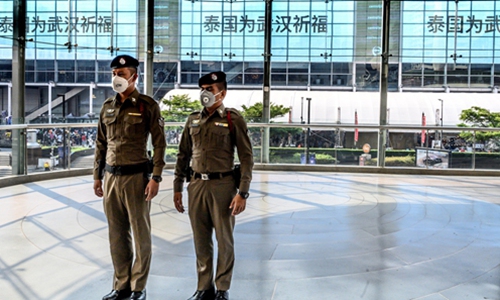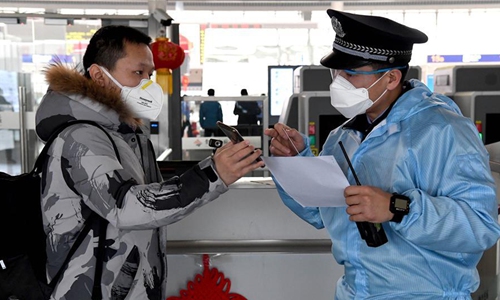
Thai policemen pose for a photograph in front of big screens reading in Chinese "Our hearts to Wuhan" placed outside a shopping mall in Bangkok on February 2, 2020. Photo: AFP
As more information and data regarding the novel coronavirus is being transparently released and shared with the world, the varied responses of the international community to the epidemic are worthy of attention.
While China dedicates mammoth resources to contain the epidemic, several Western countries are exploiting the crisis to smear China and drive a wedge between the Communist Party of China and the Chinese people. In contrast, Southeast Asian countries that are close to China have a milder reaction to the epidemic and offer moral support to China.
One reason for this contrast is the "China threat" theory, with which Western countries observe China through the tinted spectacles of ideology and thus cannot view the epidemic fairly.
The Chinese government and people are sparing no effort to fight this novel coronavirus and are pushing forward infection prevention and control in a swift, orderly and precise manner.
Singaporean Prime Minister Lee Hsien Loong said on Saturday in Chinese that China is making all-out efforts to control and what China has been doing is responsible.
Cambodian Prime Minister Hun Sen has plan to visit Wuhan during his visit to China, information available suggests.
Many Western countries have intentionally discounted China's efforts, which have included the timely sharing of information with other countries that has helped the number of cases in the rest of the world remain relatively small.
The New York Times said in an article that Southeast Asian countries have had a "quieter response to coronavirus" as China "holds sway" in the region, smearing China by suggesting it has been pressuring countries that have deep economic ties.
This is typical Western-style slander that comes out of thin air. It is up to each country to decide how it will respond to the epidemic and China, according to their own national conditions. Southeast Asian governments are making their own independent choice.
The New York Times should ask the White House or US Secretary of State Mike Pompeo who are threatening US allies to prevent Chinese telecom giant Huawei from participating 5G rollout in some European countries.
When SARS, (Severe Acute Respiratory Syndrome), a deadly coronavirus, imposed threats to public health security worldwide in 2003, China cooperated with Southeast Asian countries to eliminate the epidemic, and achieved valuable experience in successful prevention, control and treatment of the virus. It is expected that such cooperation can continue in global joint fight against coronavirus.
Some Southeast Asian countries have also enacted entry restrictions out of concern for their own public health security - as their medical systems are not as capable as China's to fight the virus - but have not used the crisis to demonize China or politicize the epidemic.
Philippine President Rodrigo Duterte said on Monday that "it's like a xenophobia" to blame Chinese amid the outbreak of the virus, after the country reported the first virus-related death outside China. For Duterte, the spread of the virus is no one's fault, as it could have started anywhere in the world.
Some politicians in the West, especially in the US, have made comments and taken actions that are neither based on facts, nor helpful. In ghastly inappropriate remarks US Commerce Secretary Wilbur Ross suggested the outbreak of the sometimes deadly coronavirus is an opportunity for the US.
The outbreak of coronavirus is not about a certain nationality or a particular race, but a public health emergency. As Lee said in his Saturday remarks, people must face the facts calmly and try to understand them in a logical way. "Anti-Chinese attitude is no good, and it will not help figure a way out," he said.
Joining hand with China, which has made responsible efforts, rather than adding insult to injury, is a reasonable choice to win over the challenge.
The article was compiled by Global Times reporter Xu Hailin based on an interview with Xu Liping, fellow and director of the Department of Social & Culture Studies, National Institute of International Strategy, Chinese Academy of Social Sciences. xuhailin@globaltimes.com.cn

